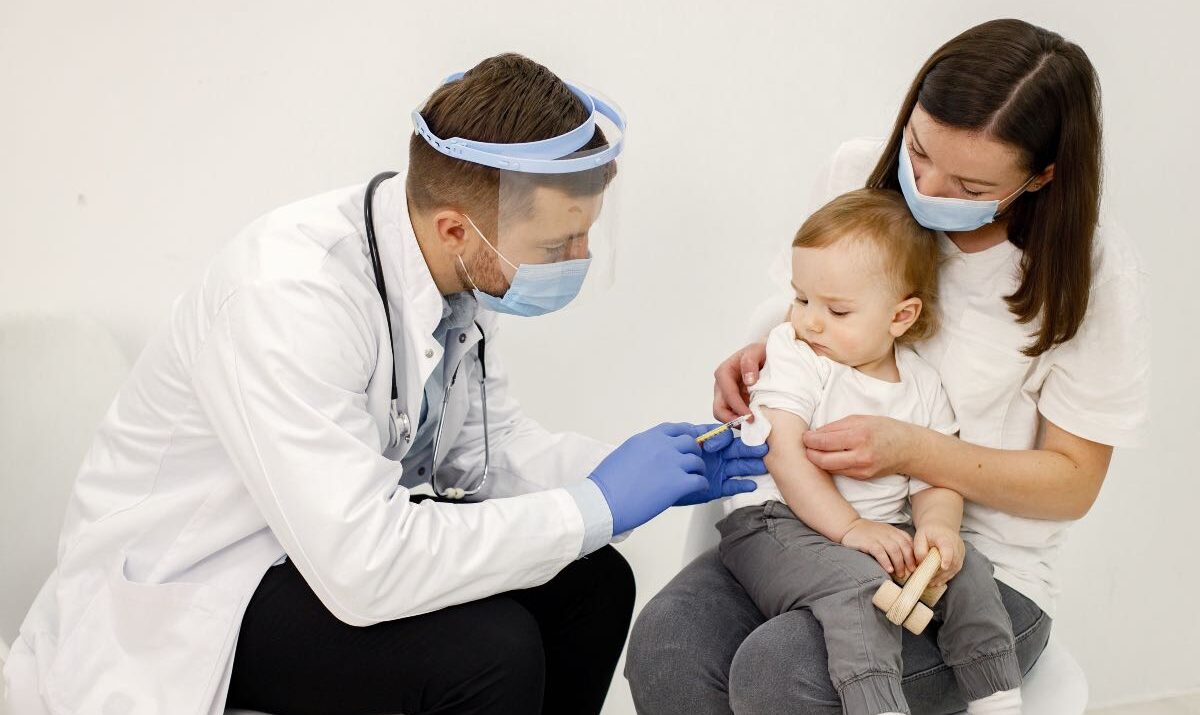Amidst all the cuddles, diaper changes, and late-night lullabies, there’s a crucial aspect of your baby’s health that deserves top priority: infant vaccination. This involves giving babies shots to help their bodies build up protection against potentially harmful diseases. These vaccinations are usually scheduled at specific intervals, such as 2 months, 4 months, and so on, to provide ongoing immunity as the child grows.
In this article, we’ve got you covered on everything you need to know about newborn vaccination – the when, the what, and most importantly, the why behind infant immunization.
Newborn Shots Schedule – Which Vaccines and When
When it comes to infant vaccinations, timing is key. They typically start soon after birth and continue at regular intervals throughout childhood. The exact schedule varies slightly depending on factors like regional guidelines and individual health considerations, but commonly, vaccinations begin at 2 months old and continue at 4 months, 6 months, and so on.
As for what vaccines your baby needs, there are several standard ones recommended by healthcare professionals. Here’s a complete breakdown of the vaccines for newborns as well as the newborn shots schedule:
0-2 months infant vaccines
- Hepatitis B vaccine (HepB): Safeguards against hepatitis B virus, known for its potential to induce liver complications. Administered at birth and again at 1-2 months.
- DTaP vaccine (Diphtheria, Tetanus, and Pertussis): Safeguards against diphtheria, tetanus, and severe cough, known for their ability to provoke severe respiratory issues and life-threatening outcomes. Given at 2 months.
- RV vaccine (Rotavirus): Protects against rotavirus infections, known for causing severe gastrointestinal symptoms and potential hospitalization. Given at 2 months.
- Hib vaccine (Haemophilus influenzae type b): Shields against Hib bacteria, recognized for its potential to incite serious diseases like pneumonia and meningitis in young children. Administered at 2 months.
- PCV vaccine (Pneumococcal Conjugate): Guards against pneumococcal bacteria, which pose a threat of pneumonia, meningitis, and other severe conditions. Administered at 2 months.
- IPV vaccine (Inactivated Poliovirus): Protects against polio, a disease known to cause paralysis and other lifelong disabilities. Given at 2 months.
2-4 months infant vaccines
Booster doses of DTaP, RV, Hib, PCV, and IPV vaccines are administered around 4 months.
4-6 months infant shot
Final doses of DTaP, RV, Hib, PCV, and IPV vaccines are given around 6 months.
6-12 months vaccine for newborn
Influenza vaccine (Yearly): Guards against influenza viruses, known for causing severe illness and complications in young children. Administered yearly starting at 6 months.
12-15 months infant vaccine
- MMR vaccine (Measles, Mumps, and Rubella): Protects against measles, mumps, and rubella, which can result in serious complications including brain damage and deafness. Given at 12-15 months.
- Varicella vaccine (Chickenpox): Protects against chickenpox, known for its potential to induce severe skin infections and complications like pneumonia. Administered at 12-15 months.
15-18 months vaccines for newborn
Booster doses of DTaP, Hib, PCV, and the final dose of HepB vaccine are given around 18 months.
How to Prepare Your Infant for Shots
When it comes to infant vaccination, the anticipation can be a source of anxiety for both you and your baby. However, with thoughtful preparation and a few comforting ways, you can turn the vaccination experience into a less stressful event.
- Schedule wisely: Plan appointments during a calm time for both you and your baby. Avoid scheduling vaccinations during your baby’s naptime or feeding time to reduce the chances of added fussiness.
- Stay calm: Reassure your baby with a soft tone and maintain a positive attitude.
- Use comforting techniques: Consider breastfeeding or offering a bottle during or after the vaccination to provide comfort and distraction. Gentle rocking or swaying works for many.
- Bring distractions: Pack a favourite toy or blanket or use music to engage your baby’s attention. This can help create a soothing environment at the doctor’s office.
- Post-vaccination comfort: After the shots, be ready to offer extra comfort and cuddles. Your baby may experience some tenderness or fussiness, and your hugs can make them feel better.
- Prioritize well-being: Ensure your baby is well-fed and rested before the appointment to minimize stress and discomfort.
How Long Do Babies Feel Unwell After Vaccinations?
It’s not uncommon for babies to feel a bit unwell after immunization. However, these side effects are typically mild and temporary. Common side effects of infant vaccination are fever, fussiness, or soreness at the injection site. In most cases, discomfort or fussiness might last for a day or two.
And in case, if you see any bump or mark on the injection site, ask for ointment or cream from your pediatrician. Applying it as prescribed by the expert will help heal the injection site and reduce any discomfort your baby may experience.
Another thing to take care of is to keep monitoring your baby’s temperature. If it goes above the normal range or if you notice any concerning symptoms, such as persistent crying or difficulty breathing, contact your pediatrician immediately.
Home Remedies to Make Babies Feel Better After Vaccinations
After infant immunization, it’s common for babies to experience soreness at the injection site. To alleviate this discomfort, you can apply a cool compress to the area. This helps reduce inflammation and provides relief.
Additionally, ensuring your baby stays hydrated is essential. Offer more breast milk or formula to keep them well-hydrated, which can also help alleviate any discomfort.
Gentle massage can further help ease soreness. Using circular motions, massage the injection site gently to promote blood flow and relaxation, providing your baby with comfort after their vaccinations.
These simple home remedies can go a long way in making your baby feel better after their shots.




